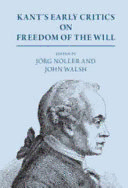Table Of ContentKANT’S EARLY CRITICS ON FREEDOM
OF THE WILL
ThisbookofferstranslationsofearlycriticalreactionstoKant’saccount
offreewill.Spanningtheyears1784–1800,thetranslationsmakeavail-
able,forthefirsttimeinEnglish,worksbylittle-knownthinkersinclud-
ing Pistorius, Ulrich, Heydenreich, Creuzer and others, as well as
familiar figures including Reinhold, Fichte and Schelling. Together
they are a testimony to the intense debates surrounding the reception
of Kant’s account of free will in the 1780s and 1790s, and throw into
reliefthecontroversiesconcerningthecoherenceofKant’sconceptof
transcendental freedom, the possibility of reconciling freedom with
determinism,therelationbetweenfreewillandmoralimputation,and
other arguments central to Kant’s view. The volume also includes a
helpfulintroduction,aglossaryofkeytermsandbiographicaldetailsof
thecritics,andwillprovideavaluablefoundationforfurtherresearchon
freewillinpost-Kantianphilosophy.
JörgNollerislecturerinphilosophyatLMUMunich.Hehaspublished
numerousbooksonKantandGermanidealism,includingTheConceptof
WillinClassicalGermanPhilosophy(withManjaKisner,2020)aswellas
articlesinjournalsincludingtheEuropeanJournalofPhilosophyandKant-
Studien.
John Walsh is postdoctoral researcher at Martin-Luther-Universität
Halle-Wittenberg, where he is coordinator of the “Obligation of
SocietalNorms”InternationalGraduateSchool.Hehaswrittenseveral
bookchaptersonfreewillandethicsinGermanidealism.
(cid:19)(cid:6)(cid:12)(cid:11)(cid:17)(cid:10)(cid:8)(cid:7)(cid:1)(cid:15)(cid:14)(cid:12)(cid:11)(cid:14)(cid:8)(cid:1)(cid:6)(cid:21)(cid:1)(cid:2)(cid:5)(cid:13)(cid:6)(cid:16)(cid:11)(cid:7)(cid:9)(cid:8)(cid:1)(cid:4)(cid:14)(cid:11)(cid:20)(cid:8)(cid:16)(cid:17)(cid:11)(cid:18)(cid:21)(cid:1) (cid:16)(cid:8)(cid:17)(cid:17)
(cid:19)(cid:6)(cid:12)(cid:11)(cid:17)(cid:10)(cid:8)(cid:7)(cid:1)(cid:15)(cid:14)(cid:12)(cid:11)(cid:14)(cid:8)(cid:1)(cid:6)(cid:21)(cid:1)(cid:2)(cid:5)(cid:13)(cid:6)(cid:16)(cid:11)(cid:7)(cid:9)(cid:8)(cid:1)(cid:4)(cid:14)(cid:11)(cid:20)(cid:8)(cid:16)(cid:17)(cid:11)(cid:18)(cid:21)(cid:1) (cid:16)(cid:8)(cid:17)(cid:17)
KANT’S EARLY CRITICS ON
FREEDOM OF THE WILL
translated and edited by
JÖRG NOLLER
LudwigMaximilianUniversityofMunich
JOHN WALSH
MartinLutherUniversityofHalle-Wittenberg
(cid:19)(cid:6)(cid:12)(cid:11)(cid:17)(cid:10)(cid:8)(cid:7)(cid:1)(cid:15)(cid:14)(cid:12)(cid:11)(cid:14)(cid:8)(cid:1)(cid:6)(cid:21)(cid:1)(cid:2)(cid:5)(cid:13)(cid:6)(cid:16)(cid:11)(cid:7)(cid:9)(cid:8)(cid:1)(cid:4)(cid:14)(cid:11)(cid:20)(cid:8)(cid:16)(cid:17)(cid:11)(cid:18)(cid:21)(cid:1) (cid:16)(cid:8)(cid:17)(cid:17)
UniversityPrintingHouse,Cambridgecb28bs,UnitedKingdom
OneLibertyPlaza,20thFloor,NewYork,ny10006,USA
477WilliamstownRoad,PortMelbourne,vic3207,Australia
314–321,3rdFloor,Plot3,SplendorForum,JasolaDistrictCentre,
NewDelhi–110025,India
103PenangRoad,#05–06/07,VisioncrestCommercial,Singapore238467
CambridgeUniversityPressispartoftheUniversityofCambridge.
ItfurtherstheUniversity’smissionbydisseminatingknowledgeinthepursuitof
education,learning,andresearchatthehighestinternationallevelsofexcellence.
www.cambridge.org
Informationonthistitle:www.cambridge.org/9781108482462
doi:10.1017/9781108687720
©CambridgeUniversityPress2022
Thispublicationisincopyright.Subjecttostatutoryexception
andtotheprovisionsofrelevantcollectivelicensingagreements,
noreproductionofanypartmaytakeplacewithoutthewritten
permissionofCambridgeUniversityPress.
Firstpublished2022
AcataloguerecordforthispublicationisavailablefromtheBritishLibrary.
LibraryofCongressCataloging-in-PublicationData
names:Noller,Jörg,1984–compiler,translator.|Walsh,John,1988–compiler,
translator.
title:Kant’searlycriticsonfreedomofthewill/[compiledandtranslatedby]Jörg
Noller,Ludwig-Maximilians-UniversitätMunchen,JohnWalsh,Martin
Luther-UniversitätHalle-Wittenberg,Germany.
description:Cambridge,UnitedKingdom;NewYork,NY,USA:Cambridge
UniversityPress,2021.|Includesbibliographicalreferencesandindex.|Articles
translatedfromGerman.
identifiers:lccn2021012632(print)|lccn2021012633(ebook)|isbn
9781108482462(hardback)|isbn9781108729673(paperback)|isbn
9781108687720(ebook)
subjects:lcsh:Kant,Immanuel,1724–1804.|Freewillanddeterminism.|
BISAC:PHILOSOPHY/History&Surveys/Modern|PHILOSOPHY/History
&Surveys/Modern
classification:lccb2799.f8k372021(print)|lccb2799.f8(ebook)|
ddc123/.5–dc23
LCrecordavailableathttps://lccn.loc.gov/2021012632
LCebookrecordavailableathttps://lccn.loc.gov/2021012633
isbn978-1-108-48246-2Hardback
CambridgeUniversityPresshasnoresponsibilityforthepersistenceoraccuracyof
URLsforexternalorthird-partyinternetwebsitesreferredtointhispublication
anddoesnotguaranteethatanycontentonsuchwebsitesis,orwillremain,
accurateorappropriate.
(cid:19)(cid:6)(cid:12)(cid:11)(cid:17)(cid:10)(cid:8)(cid:7)(cid:1)(cid:15)(cid:14)(cid:12)(cid:11)(cid:14)(cid:8)(cid:1)(cid:6)(cid:21)(cid:1)(cid:2)(cid:5)(cid:13)(cid:6)(cid:16)(cid:11)(cid:7)(cid:9)(cid:8)(cid:1)(cid:4)(cid:14)(cid:11)(cid:20)(cid:8)(cid:16)(cid:17)(cid:11)(cid:18)(cid:21)(cid:1) (cid:16)(cid:8)(cid:17)(cid:17)
Contents
Acknowledgements pagevii
NoteontheEditionandTranslation ix
ChronologyoftheTranslatedTextsandKant’sMajorWorks xi
ListofAbbreviations xiv
HistoricalandSystematicIntroduction xvi
I. FreedomandDeterminism 1
HermannAndreasPistorius,Reviewof“ElucidationsofProfessor
Kant’s‘CritiqueofPureReason’byJoh.Schulze,RoyalPrussian
CourtChaplain.Königsberg:Dengel,1784.8,254pages,”1786 3
JohannAugustHeinrichUlrich,EleutheriologyorOnFreedom
andNecessity,Jena,1788 9
ChristianWilhelmSnell,OnDeterminismandMoralFreedom,
Offenbach,1789 24
AugustLudwigChristianHeydenreich,OnFreedomandDeterminism
andTheirCompatibility,Erlangen,1793 41
II. FreedomandImputability 61
CarlChristianErhardSchmid,LexiconfortheEasierUseofthe
KantianWritings,2ndEdition,1788 63
CarlChristianErhardSchmid,AttemptataMoralPhilosophy,Jena,1790 72
JohannChristophSchwab,“OntheTwoKindsofI,andtheConceptof
FreedominKant’sEthics,”PhilosophischesArchiv1(1)(1792),69–80 83
JohannChristophSchwab,“OnIntelligibleFatalismintheCritical
Philosophy,”PhilosophischesArchiv2(2)(1794),26–33 89
KarlLeonhardReinhold,ContributionstotheCorrectionofPrevious
MisunderstandingsofPhilosophers,Volumeii,Concerningthe
FoundationofPhilosophicalKnowledge,Metaphysics,Ethics,
MoralReligion,andDoctrineofTaste,Jena,1794 93
III. FreedomandConsciousness 117
LudwigHeinrichvonJakob,“OnFreedom,”Berlin,1788 119
KarlHeinrichHeydenreich,“OnMoralFreedom,”inBetrachtungen
überdiePhilosophiedernatürlichenReligion,Volumeii,Leipzig,
1791,56–69 127
JohannHeinrichAbicht,“OntheFreedomoftheWill,”Neues
PhilosophischesMagazin1,PartI(III),(Leipzig,1789),64–85 135
v
(cid:19)(cid:6)(cid:12)(cid:11)(cid:17)(cid:10)(cid:8)(cid:7)(cid:1)(cid:15)(cid:14)(cid:12)(cid:11)(cid:14)(cid:8)(cid:1)(cid:6)(cid:21)(cid:1)(cid:2)(cid:5)(cid:13)(cid:6)(cid:16)(cid:11)(cid:7)(cid:9)(cid:8)(cid:1)(cid:4)(cid:14)(cid:11)(cid:20)(cid:8)(cid:16)(cid:17)(cid:11)(cid:18)(cid:21)(cid:1) (cid:16)(cid:8)(cid:17)(cid:17)
Contents
IV. FreedomandSkepticism 145
LeonhardCreuzer,SkepticalReflectionsonFreedomoftheWillwith
RespecttotheMostRecentTheoriesontheSame,Giessen,1793 147
FriedrichCarlForberg,OntheGroundsandLawsofFreeActions,
JenaandLeipzig,1795 178
JohannGottliebFichte,Reviewof“SkepticalReflectionsonFreedom
oftheWillwithRespecttotheMostRecentTheoriesontheSameby
LeonhardCreuzer,1793,”AllgemeineLiteratur-Zeitung303(1793),
Cols.201–205 207
SalomonMaimon,“TheMoralSkeptic,”BerlinischesArchivderZeit
undihresGeschmacks2(1800),271–292 213
V. FreedomandChoice 227
ImmanuelKant,PreliminaryNotesandReflectionstothe
IntroductiontotheMetaphysicsofMorals,Before1797 229
ImmanuelKant,IntroductiontotheMetaphysicsofMorals,1797 232
KarlLeonhardReinhold,“SomeRemarksontheConceptofthe
FreedomoftheWill,PosedbyI.KantintheIntroductiontothe
MetaphysicalFoundationsoftheDoctrineofRight,”inAuswahl
vermischterSchriften,Volumeii,Jena,1797,364–400 238
FriedrichWilhelmJosephSchelling,“GeneralOverviewofthe
MostRecentPhilosophicalLiterature,”PhilosophischesJournal
7(2)(JenaandLeipzig,1797),105–186 250
Appendix: BiographicalSketches 263
Glossary 269
Notes 280
Bibliography 298
Index
IndexofPersons 309
IndexofSubjects 310
vi
(cid:19)(cid:6)(cid:12)(cid:11)(cid:17)(cid:10)(cid:8)(cid:7)(cid:1)(cid:15)(cid:14)(cid:12)(cid:11)(cid:14)(cid:8)(cid:1)(cid:6)(cid:21)(cid:1)(cid:2)(cid:5)(cid:13)(cid:6)(cid:16)(cid:11)(cid:7)(cid:9)(cid:8)(cid:1)(cid:4)(cid:14)(cid:11)(cid:20)(cid:8)(cid:16)(cid:17)(cid:11)(cid:18)(cid:21)(cid:1) (cid:16)(cid:8)(cid:17)(cid:17)
Acknowledgements
This translation is the work of both of us over the course of several
years.TheideafortheprojectstemsfromadiscussionbetweenJörg
Noller, Karl Ameriks, and Günter Zöller at the Fifth International
Reinhold Conference in Siegen, Germany, in 2010. This seed came
to fruition at the Sixth International Reinhold Conference in 2017,
when we decided to move forward on it. Since the project’s incep-
tion we have benefited greatly from the assistance of a number of
individuals. Our thanks go to Martin Bondeli, Kevin Fink, Silvan
Imhoff, Bennett McNulty, the students in John Walsh’s
“Willensfreiheit im Ausgang von Kant” seminar at the Martin
Luther University of Halle-Wittenberg in 2019 (especially Steven
Reinhardt), Raman Sachdev, Sonja Schierbaum, Jim Walsh, and
especiallySebastianAbelandMichaelWalschotsforhelpfulsugges-
tionsregardingtheconceptionofthevolumeandtherevisionofthe
translation. We would also like to thank Heiner Klemme, Simon
Mussel, and Sonja Schierbaum for comments on the Introduction.
We are grateful to Jakob Grüner, Tabatha Portejoie, and Philip
Zogelmann for their work in providing typescripts of the original
German texts.
Both of us would like to thank Hilary Gaskin for her patience and
support,andexpressourgratitudeforthefinancialsupportprovidedby
theGermanResearchFoundationviatheresearchnetwork“Freedom–
Morality–Politics:PracticalPhilosophyafterKant(1785–1800)”(no.
1240/6-1).WearegratefultoDanielBreazealeandThomasBuchheim
fortheirencouragement,andtoCourtneyFugateandJohnHymersfor
providing us with their translation of Baumgarten’s Elements of First
PracticalPhilosophy.John’sworkon theprojectproposalwasfacilitated
byaDissertationCompletionFellowshipfromtheUniversityofSouth
Florida and a Doctoral Research Fellowship from the University of
Fribourg under the guidance of Jean-Claude Wolf and Martin
Bondeli; his translation work on drafts of several texts was completed
under the auspices of a Visiting Research Fellowship at Brown
University, where he benefited from the advice of Paul Guyer, for
whichheisgrateful.JohnwouldalsoliketothankElisabethDécultot,
Daniel Fulda, and Andrea Thiele of the Interdisciplinary Centre for
vii
(cid:19)(cid:6)(cid:12)(cid:11)(cid:17)(cid:10)(cid:8)(cid:7)(cid:1)(cid:15)(cid:14)(cid:12)(cid:11)(cid:14)(cid:8)(cid:1)(cid:6)(cid:21)(cid:1)(cid:2)(cid:5)(cid:13)(cid:6)(cid:16)(cid:11)(cid:7)(cid:9)(cid:8)(cid:1)(cid:4)(cid:14)(cid:11)(cid:20)(cid:8)(cid:16)(cid:17)(cid:11)(cid:18)(cid:21)(cid:1) (cid:16)(cid:8)(cid:17)(cid:17)
Acknowledgements
European Enlightenment Studies (IZEA) for their patronage, and
Heiner Klemme of the International Graduate School “Obligation of
Societal Norms” forhisgenerous support.The present volumewould
not have been possible without the assistance of the above-mentioned
institutionsandindividuals.
viii
(cid:19)(cid:6)(cid:12)(cid:11)(cid:17)(cid:10)(cid:8)(cid:7)(cid:1)(cid:15)(cid:14)(cid:12)(cid:11)(cid:14)(cid:8)(cid:1)(cid:6)(cid:21)(cid:1)(cid:2)(cid:5)(cid:13)(cid:6)(cid:16)(cid:11)(cid:7)(cid:9)(cid:8)(cid:1)(cid:4)(cid:14)(cid:11)(cid:20)(cid:8)(cid:16)(cid:17)(cid:11)(cid:18)(cid:21)(cid:1) (cid:16)(cid:8)(cid:17)(cid:17)
Note on the Edition and Translation
The texts contained in the present volume provide a fascinating testi-
monytothesignificanceofthereceptionofKant’saccountoffreewill.
We have sought to provide an accurate translation of these texts that
conveystheirphilosophicalimportinmodernEnglish.
Inadditiontotheirphilosophicaldiversity,thetextsdifferwithrespect
totheirstyleofprose.Eachtextbearsthedistinctivemarkoftheauthor’s
compositional style. We have sought to maintain each author’s syntax
andstyleinourtranslations.However,wehaveoccasionallybrokenup
long and convoluted sentences into several English sentences.
Furthermore,wehaveemendedexceedinglyawkwardpunctuationwith-
outindicatingthis.Forexample,contrarytobothmodernEnglishaswell
as eighteenth-century German custom, Leonhard Creuzer at times
employsanem-dashtoisolateawordorphraseattheendofasentence
foremphasis.Wehavechosentoemphasizesuchphraseswithitalics.
TheoriginalGermantextsemployvariedtypographyforemphasis,
including boldface, italics, increased tracking between characters, full
caps, and larger font size, as well as combinations thereof. While we
have emphasized phrases according to the German text in order to
preserve the integrity of the original, we have uniformly rendered any
of the above-mentioned typographical conventions in italics and any
combination of them in both boldface and italics. All phrases in a
language other than German have been italicized, even if this was not
doneintheoriginaltext.
Asmuchaspossiblewehavefollowedstandardconventionsintrans-
lating eighteenth-century philosophical terms into English. Thus,
Anschauung is translated as “intuition” and Vorstellung is rendered as
“representation.”Wehaveattemptedtotranslatekeytermsasconsist-
entlyaspossible.TheGlossaryattheendofthebookservesasaguide
for the conventions we have adopted. However, context demands a
degreeofflexibilityinordertoproduceasensitiveandaccuratetransla-
tion. Deviations from the conventions indicated in the Glossary,
ambiguousterms,andphraseswhichotherwiseposeparticulardifficulty
fortranslationhavebeenmarkedinalphanumericalfootnotes.Wehave
noted cases where several German terms are rendered by the same
English word, e.g. Begehren and Begierde are both generally rendered
ix
(cid:19)(cid:6)(cid:12)(cid:11)(cid:17)(cid:10)(cid:8)(cid:7)(cid:1)(cid:15)(cid:14)(cid:12)(cid:11)(cid:14)(cid:8)(cid:1)(cid:6)(cid:21)(cid:1)(cid:2)(cid:5)(cid:13)(cid:6)(cid:16)(cid:11)(cid:7)(cid:9)(cid:8)(cid:1)(cid:4)(cid:14)(cid:11)(cid:20)(cid:8)(cid:16)(cid:17)(cid:11)(cid:18)(cid:21)(cid:1) (cid:16)(cid:8)(cid:17)(cid:17)
NoteontheEditionandTranslation
as “desire.” In cases where a Latinate and a Germanic word are both
translatedintoEnglishbythesameword,instancesoftheLatinateterm
are indicated in the alphanumeric footnotes, e.g. whereas Faktum and
Tatsache are both translated as “fact,” only the former is indicated.
Footnotes of the originalauthor are indicatedby asterisks. Numbered
endnotes are informational. Many provide references to relevant pas-
sageseitherfromtextscontainedinthepresentvolumeorfromKant’s
texts.Wehopethatthesewillhelpsituatethetranslatedtextswithinthe
broadercontextofthereceptionofKant’saccountoffreewill.
Unlessotherwisenoted,thepagenumberswithinthetranslatedtext,
e.g. “[218],” refer to the original pagination. The references to Kant’s
texts refer to the pagination of the Akademie Ausgabe (Ak.), except
references to the Critique of Pure Reason, which refer to the standard
A/B pagination of the first and second editions, respectively. The sec-
tionandparagraphstructureoftheoriginaltextshasbeenretained.We
have occasionally inserted editorial interpolations, which are placed
withinsquarebrackets.
Several authors offer quotations of other authors within the text.
Unfortunately, the authors are at times careless in citing these or in
marking quoted passages in quotation marks. In cases where another
author is clearly being directly quoted, we have inserted quotation
marksandindicatedthisinletteredfootnotes.Alltranslationsofquoted
material are our own. For translations of quotations of Kant, we have
consulted the existing translation found in the relevant work of the
Cambridge Edition of the Works of Immanuel Kant. For our transla-
tionoftheIntroductiontoTheMetaphysicsofMorals,weconsultedthe
translations by Mary J. Gregor and John Ladd. For our translation of
Fichte’sreviewofLeonhardCreuzer’sSkepticalReflections,weconsulted
thetranslationbyDanielBreazeale.Ingeneral,thetranslationsinthis
volumearebasedontheoriginaltextorafacsimilereprint.
x
(cid:19)(cid:6)(cid:12)(cid:11)(cid:17)(cid:10)(cid:8)(cid:7)(cid:1)(cid:15)(cid:14)(cid:12)(cid:11)(cid:14)(cid:8)(cid:1)(cid:6)(cid:21)(cid:1)(cid:2)(cid:5)(cid:13)(cid:6)(cid:16)(cid:11)(cid:7)(cid:9)(cid:8)(cid:1)(cid:4)(cid:14)(cid:11)(cid:20)(cid:8)(cid:16)(cid:17)(cid:11)(cid:18)(cid:21)(cid:1) (cid:16)(cid:8)(cid:17)(cid:17)

